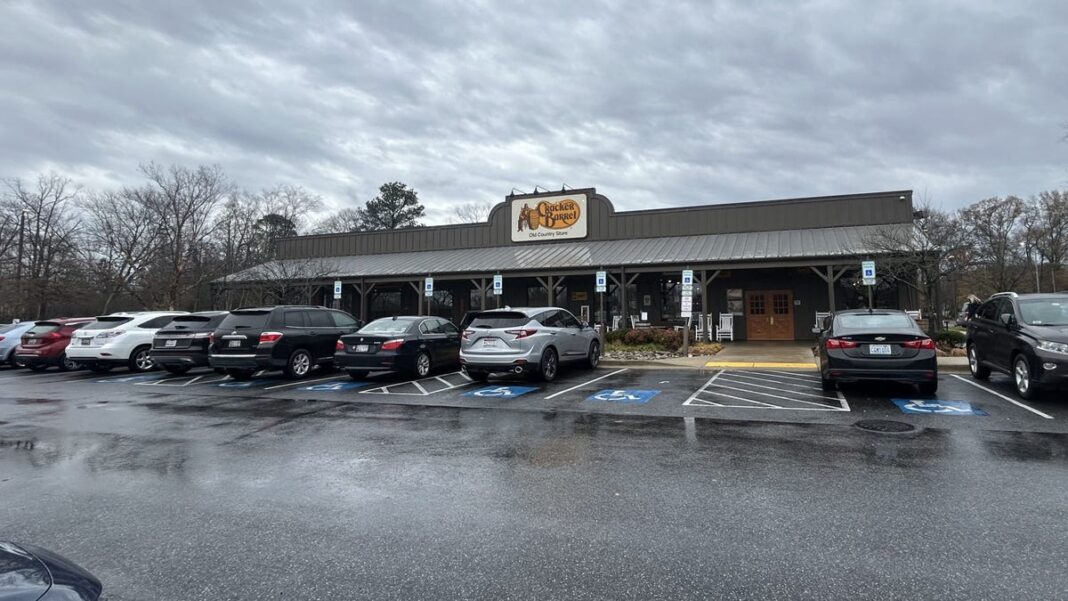Parents Express Disappointment After Meeting with Cracker Barrel Executives Over Special Education Treatment
Parents voiced their disappointment following an emotional meeting with executives from Cracker Barrel on Monday, just a week after a group of special education students was denied dine-in service at the Waldorf, Maryland restaurant.
During Monday’s meeting, attended by local education leaders and two senior Cracker Barrel executives, discussions centered around the treatment of students from Charles County Public Schools at the Waldorf restaurant.
The atmosphere was tense, as described by parents Johnna Penrod and Elise Horne, both of whom were present at the meeting held at the F.B. Gwynn Educational Center, which drew around 20-25 participants.
According to Superintendent Maria Navarro, on December 3, a group consisting of 11 students and seven staff members from the district was “refused service” while on a community-based instruction field trip to Cracker Barrel. The students were from Dr. James Craik Elementary School and participated in the ACHIEVE program for students with significant cognitive disabilities, and the SOAR program for students with autism.
Penrod’s 7-year-old daughter, Madelynn, who is nonverbal and autistic, was among the students affected. Horne’s son did not partake in the trip.
Both mothers recounted that one executive expressed regret that the community felt the students were discriminated against, which upset many parents in attendance.
“That really hurt the parents,” Horne noted.
Horne also mentioned that another executive shared a conflicting narrative from the staff at the Waldorf location regarding the incident, which further complicated discussions and led to tension, as some felt it implied dishonesty from educators. She highlighted that her son, who partakes in similar instruction trips, has not experienced any problems.
Both Penrod and Dustin Reed, Madelynn’s father, stated that executives relayed to those present that the restaurant staff disputed the accounts provided by the Charles County Public Schools teachers.
Cracker Barrel confirmed the meeting occurred but did not provide specific details or identify the executives involved.
What Occurred at the Cracker Barrel?
Last week, at the restaurant, Cracker Barrel staff informed the group from Charles County Public Schools that they could not serve them and suggested that the location be removed from the approved venues for school trips, as communicated by special education teacher Katie Schneider in an email to the parents regarding the outing.
In their response to YSL News, Cracker Barrel clarified that staff did not refuse service outright but admitted that inadequate staffing and communication failures led to a significant drop in service standards that day.
While students and staff were permitted to make a to-go order, after waiting over an hour for their carryout meals, they left for the school bus outside and ultimately ate their lunch back at the elementary school.
The incident resulted in the termination of three employees, including the general manager, and Cracker Barrel announced plans to enhance staff training at the Waldorf outlet.
Parent of Child with Special Needs Finds Incident ‘Triggering’
In the wake of the recent incident, Reed organized a protest at the Waldorf Cracker Barrel scheduled for Sunday afternoon. By Thursday, over 200 people on Facebook had expressed interest, many of whom are parents of children with special needs.
Anne Strober, a parent support specialist and mother of a 24-year-old autistic son, described the news as “triggering.” She recalled a similar situation when her son faced poor treatment on a school trip in third grade.
“It was a terrible experience and hearing about the Cracker Barrel situation just brought it all back,” Strober recounted. She remembered being so outraged after the field trip that she called the establishment involved to express her dissatisfaction.
Programs Helping Students with Disabilities Thrive
According to the Centers for Disease Control and Prevention, autism affects about 1 in 36 children in the United States, or approximately 2.7% of the population.
Strober noted that when her son was diagnosed with autism in 2005, the rate was 1 in 166 children. She expressed concern over the growing number of autism diagnoses, highlighting the urgent need for support from schools that operate with limited resources.
When it came to enrolling Madelynn in school, Penrod and Reed recognized that she required a supportive, individualized learning environment.
“The SOAR program has really provided her with a place where she can learn and thrive comfortably,” Penrod shared. “It has allowed her to truly grow and succeed in her learning journey.”
Madelynn has been a participant in the Charles County Public Schools’ SOAR program for the past three years.
In the days following the incident, Penrod contemplated the possibility of keeping Madelynn at home during upcoming community-based instruction days. She even considered withdrawing her from the SOAR program altogether and looking into educational facilities specifically designed for students with autism. However, after much thought, Penrod concluded that the SOAR program is the most suitable option for her daughter.

